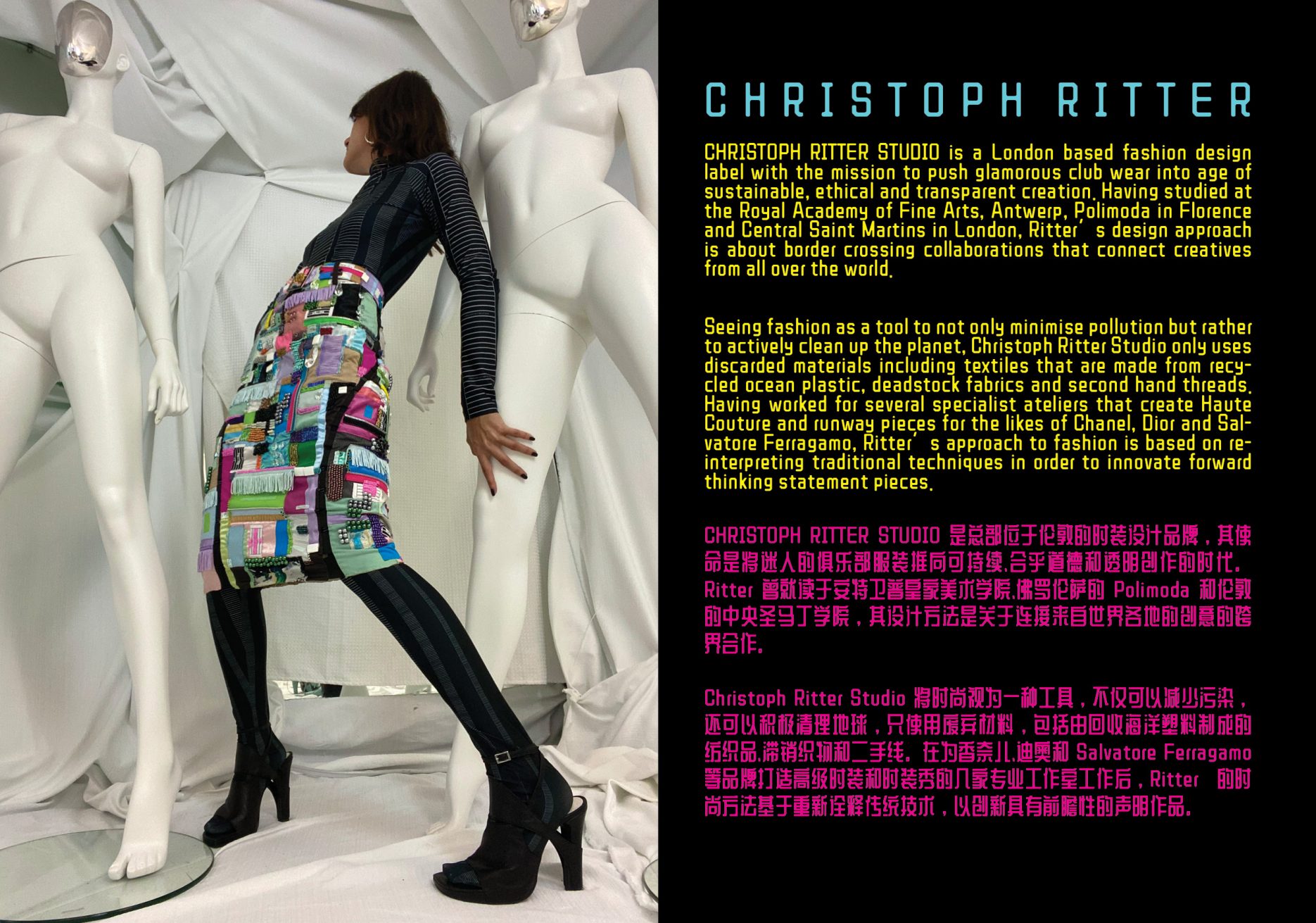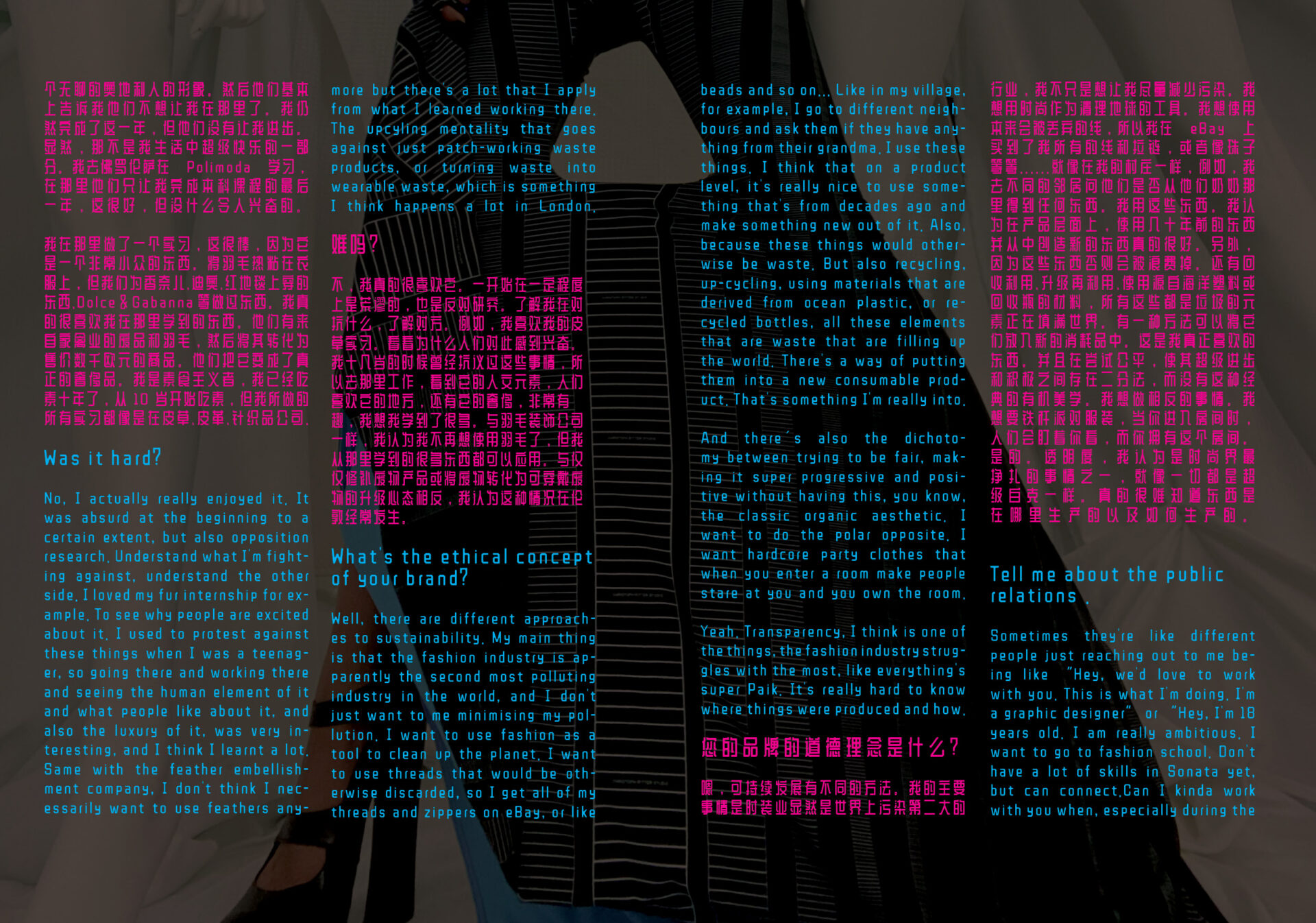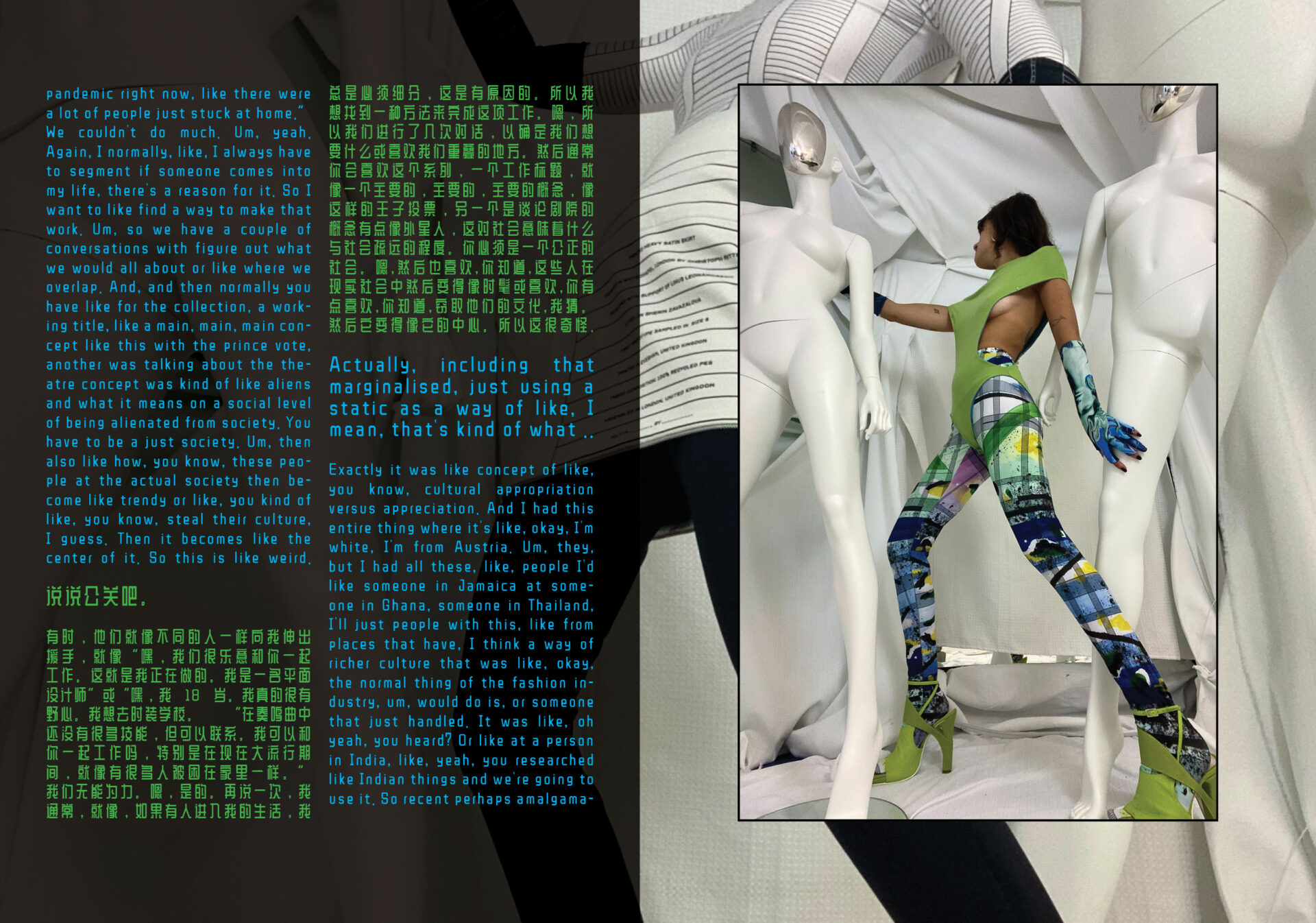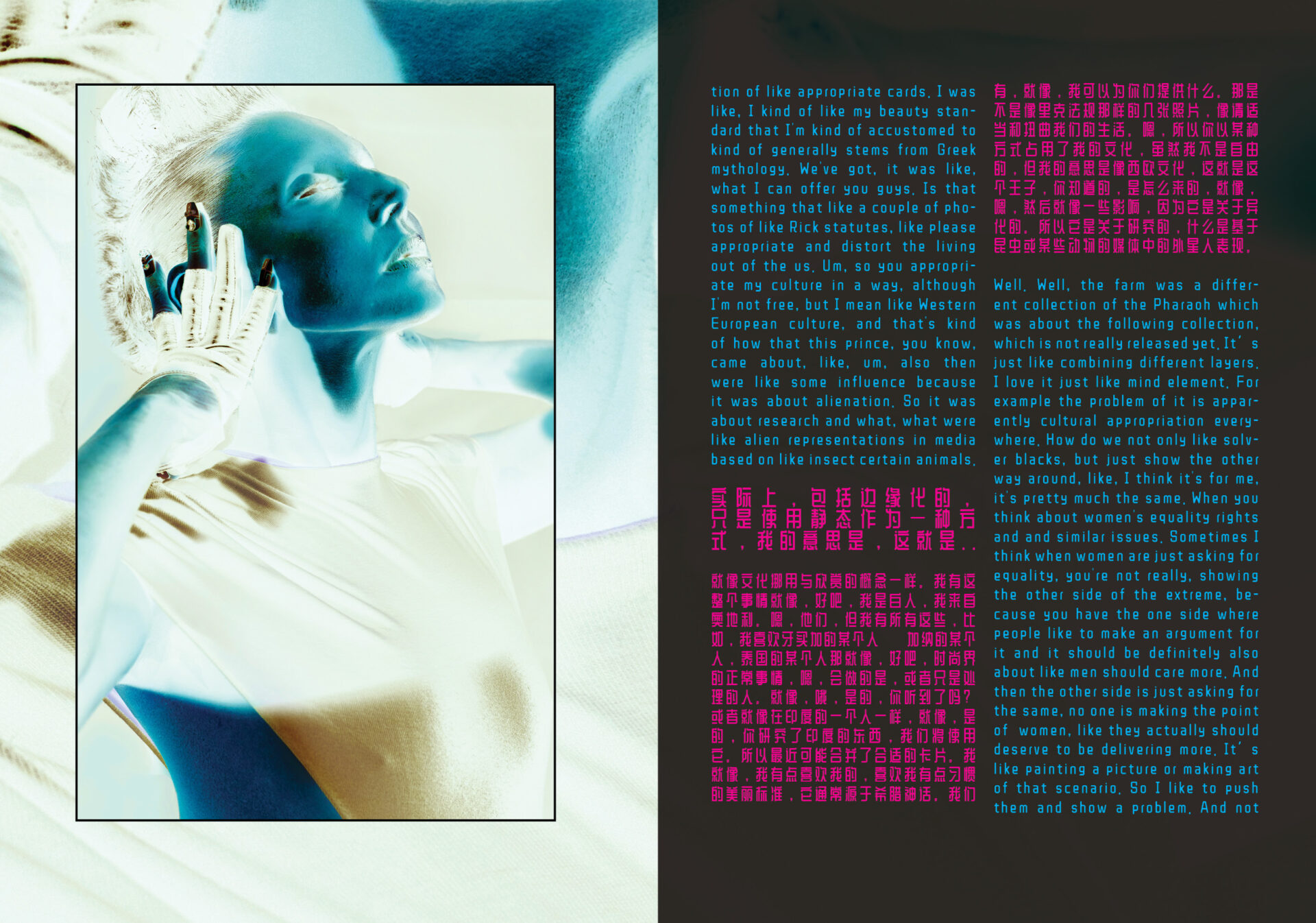
CHRISTOPH RITTER STUDIO is a London based fashion design label with the mission to push glamorous club wear into age of sustainable, ethical and transparent creation. Having studied at the Royal Academy of Fine Arts, Antwerp, Polimoda in Florence and Central Saint Martins in London, Ritter’s design approach is about border crossing collaborations that connect creatives from all over the world.
Seeing fashion as a tool to not only minimise pollution but rather to actively clean up the planet, Christoph Ritter Studio only uses discarded materials including textiles that are made from recycled ocean plastic, deadstock fabrics and second hand threads. Having worked for several specialist ateliers that create Haute Couture and runway pieces for the likes of Chanel, Dior and Salvatore Ferragamo, Ritter’s approach to fashion is based on reinterpreting traditional techniques in order to innovate forward thinking statement pieces.
CHRISTOPH RITTER STUDIO 是总部位于伦敦的时装设计品牌,其使命是将迷人的俱乐部服装推向可持续、合乎道德和透明创作的时代。 Ritter 曾就读于安特卫普皇家美术学院、佛罗伦萨的 Polimoda 和伦敦的中央圣马丁学院,其设计方法是关于连接来自世界各地的创意的跨界合作。
Christoph Ritter Studio 将时尚视为一种工具,不仅可以减少污染,还可以积极清理地球,只使用废弃材料,包括由回收海洋塑料制成的纺织品、滞销织物和二手线。在为香奈儿、迪奥和 Salvatore Ferragamo 等品牌打造高级时装和时装秀的几家专业工作室工作后,Ritter 的时尚方法基于重新诠释传统技术,以创新具有前瞻性的声明作品。

I’m gonna have to ask you to tell me everything about yourself. When did you move to London… why… Let’s start with more biographical things
First period of my life I grew up in Austria. My family are all farmers in a village, a catholic private school – a typical boring conservative upbringing. So basically when I turned 18 I just left and moved to London probably just escaping. So I came to Central Saint Martins to do a foundation course. Then I wanted to do a Bachelor here as well, in fashion, but they all told me I shouldn’t do it. So I didn’t get into any fashion course in London. Then I applied in Paris, I didn’t succeed. Then I applied in Antwerp and didn’t get in there either. Applied two months later again, and I got in! I studied there for 3 years, then they kicked me out. Then…
我将不得不请你告诉我关于你自己的一切。你什么时候搬到伦敦的……为什么……让我们从更多的传记开始
我人生的第一个阶段是在奥地利长大。我家都是农村的农民,天主教的私立学校——典型的无聊保守的教养。所以基本上当我 18 岁的时候我就离开并搬到了伦敦,可能只是为了逃避。所以我来到中央圣马丁学院学习基础课程。然后我也想在这里攻读时尚学士,但他们都告诉我我不应该这样做。所以我没有参加伦敦的任何时装课程。然后我在巴黎申请,我没有成功。然后我在安特卫普申请,也没有进去。两个月后再次申请,我成功了!我在那里学习了3年,然后他们把我赶了出去。然后…
No, no, no. You’ll need to stop there and tell me why.
Well, the first year… The thing is, I was raised in like discipline and the school that I went to was very much about following the regime and do as you’re told. But that’s obviously not what they want you to do in art school, and that’s kind of what I did when I was studying at the beginning. I just waited for people to tell me what to do and then find solutions to it. So I passed the first year, then did the second year and I had horrible teachers. I wasn’t an excellent student in comparison to other people. I failed, repeated the entire year again and by that time I really didn’t get along with my teachers and I was starting to find myself a bit more. Going out, I was getting into club culture, then I wanted to do that, but at the time I think I already had this image of like a boring Austrian dude. And then they basically told me they didn’t want me there anymore. I still finished the year but they didn’t let me progress. Obviously that wasn’t a super happy part of my life. I went to Florence to study at Polimoda, where they let me do just the final year of their undergraduate program, which was good, but nothing exciting.
I did an internship there which was great because it was in a very niche thing. Hot gluing feathers onto garments, but we did things for Chanel, Dior, things that were worn on red carpets, Dolce & Gabanna and so on. And I really like what I learned there. They have waste products, feathers from the poultry industry, and they turn it into stuff that they sell for thousands of euros. They turn it into actual luxury. I’m vegan, I’ve been vegan for like ten years now, and vegetarian since the age of 10, but all the internships that I did were like in fur, leather, knitwear companies…
不不不。你需要停下来告诉我原因。
嗯,第一年……问题是,我在类似的纪律中长大,我去的学校非常注重遵循制度并按照你的要求去做。但这显然不是他们希望你在艺术学校做的事情,这也是我刚开始学习时所做的事情。我只是等待人们告诉我该怎么做,然后找到解决方案。所以我通过了第一年,然后是第二年,我遇到了可怕的老师。与其他人相比,我不是一个优秀的学生。我失败了,又重复了一整年,到那时我真的和老师们相处不来,我开始发现自己多了一点。走出去,我进入了俱乐部文化,然后我想这样做,但当时我认为我已经有了像一个无聊的奥地利人的形象。然后他们基本上告诉我他们不想让我在那里了。我仍然完成了这一年,但他们没有让我进步。显然,那不是我生活中超级快乐的一部分。我去佛罗伦萨在 Polimoda 学习,在那里他们只让我完成本科课程的最后一年,这很好,但没什么令人兴奋的。
我在那里做了一个实习,这很棒,因为它是一个非常小众的东西。将羽毛热粘在衣服上,但我们为香奈儿、迪奥、红地毯上穿的东西、Dolce & Gabanna 等做过东西。我真的很喜欢我在那里学到的东西。他们有来自家禽业的废品和羽毛,然后将其转化为售价数千欧元的商品。他们把它变成了真正的奢侈品。我是素食主义者,我已经吃素十年了,从 10 岁开始吃素,但我所做的所有实习都像是在皮草、皮革、针织品公司.
Was it hard?
No, I actually really enjoyed it. It was absurd at the beginning to a certain extent, but also opposition research. Understand what I’m fighting against, understand the other side. I loved my fur internship for example. To see why people are excited about it. I used to protest against these things when I was a teenager, so going there and working there and seeing the human element of it and what people like about it, and also the luxury of it, was very interesting, and I think I learnt a lot. Same with the feather embellishment company, I don’t think I necessarily want to use feathers anymore but there’s a lot that I apply from what I learned working there. The upcyling mentality that goes against just patch-working waste products, or turning waste into wearable waste, which is something I think happens a lot in London.
难吗?
不,我真的很喜欢它。一开始在一定程度上是荒谬的,也是反对研究。了解我在对抗什么,了解对方。例如,我喜欢我的皮草实习。看看为什么人们对此感到兴奋。我十几岁的时候曾经抗议过这些事情,所以去那里工作,看到它的人文元素,人们喜欢它的地方,还有它的奢侈,非常有趣,我想我学到了很多。与羽毛装饰公司一样,我认为我不再想使用羽毛了,但我从那里学到的很多东西都可以应用。与仅仅修补废物产品或将废物转化为可穿戴废物的升级心态相反,我认为这种情况在伦敦经常发生。
What’s the ethical concept of your brand?
Well, there are different approaches to sustainability. My main thing is that the fashion industry is apparently the second most polluting industry in the world, and I don’t just want to me minimising my pollution. I want to use fashion as a tool to clean up the planet. I want to use threads that would be otherwise discarded, so I get all of my threads and zippers on eBay, or like beads and so on… Like in my village, for example, I go to different neighbours and ask them if they have anything from their grandma. I use these things. I think that on a product level, it’s really nice to use something that’s from decades ago and make something new out of it. Also, because these things would otherwise be waste. But also recycling, up-cycling, using materials that are derived from ocean plastic, or recycled bottles, all these elements that are waste that are filling up the world. There’s a way of putting them into a new consumable product. That’s something I’m really into.
And there´s also the dichotomy between trying to be fair, making it super progressive and positive without having this, you know, the classic organic aesthetic. I want to do the polar opposite. I want hardcore party clothes that when you enter a room make people stare at you and you own the room.
Yeah. Transparency, I think is one of the things, the fashion industry struggles with the most, like everything’s super Paik. It’s really hard to know where things were produced and how.
您的品牌的道德理念是什么?
嗯,可持续发展有不同的方法。我的主要事情是时装业显然是世界上污染第二大的行业,我不只是想让我尽量减少污染。我想用时尚作为清理地球的工具。我想使用本来会被丢弃的线,所以我在 eBay 上买到了我所有的线和拉链,或者像珠子等等……就像在我的村庄一样,例如,我去不同的邻居问他们是否从他们奶奶那里得到任何东西。我用这些东西。我认为在产品层面上,使用几十年前的东西并从中创造新的东西真的很好。另外,因为这些东西否则会被浪费掉。还有回收利用、升级再利用、使用源自海洋塑料或回收瓶的材料,所有这些都是垃圾的元素正在填满世界。有一种方法可以将它们放入新的消耗品中。这是我真正喜欢的东西。并且在尝试公平,使其超级进步和积极之间存在二分法,而没有这种经典的有机美学。我想做相反的事情。我想要铁杆派对服装,当你进入房间时,人们会盯着你看,而你拥有这个房间。
是的。透明度,我认为是时尚界最挣扎的事情之一,就像一切都是超级白克一样。真的很难知道东西是在哪里生产的以及如何生产的。
Tell me about the public relations .
Sometimes they’re like different people just reaching out to me being like “Hey, we’d love to work with you. This is what I’m doing. I’m a graphic designer” or “Hey, I’m 18 years old. I am really ambitious. I want to go to fashion school. Don’t have a lot of skills in Sonata yet, but can connect.Can I kinda work with you when, especially during the pandemic right now, like there were a lot of people just stuck at home.” We couldn’t do much. Um, yeah. Again, I normally, like, I always have to segment if someone comes into my life, there’s a reason for it. So I want to like find a way to make that work. Um, so we have a couple of conversations with figure out what we would all about or like where we overlap. And, and then normally you have like for the collection, a working title, like a main, main, main concept like this with the prince vote, another was talking about the theatre concept was kind of like aliens and what it means on a social level of being alienated from society. You have to be a just society. Um, then also like how, you know, these people at the actual society then become like trendy or like, you kind of like, you know, steal their culture, I guess. Then it becomes like the center of it. So this is like weird.
说说公关吧。
有时,他们就像不同的人一样向我伸出援手,就像“嘿,我们很乐意和你一起工作。这就是我正在做的。我是一名平面设计师”或“嘿,我 18 岁。我真的很有野心。我想去时装学校。 “在奏鸣曲中还没有很多技能,但可以联系。我可以和你一起工作吗,特别是在现在大流行期间,就像有很多人被困在家里一样。”我们无能为力。嗯,是的。再说一次,我通常,就像,如果有人进入我的生活,我总是必须细分,这是有原因的。所以我想找到一种方法来完成这项工作。嗯,所以我们进行了几次对话,以确定我们想要什么或喜欢我们重叠的地方。然后通常你会喜欢这个系列,一个工作标题,就像一个主要的,主要的,主要的概念,像这样的王子投票,另一个是谈论剧院的概念有点像外星人,这对社会意味着什么与社会疏远的程度。你必须是一个公正的社会。嗯,然后也喜欢,你知道,这些人在现实社会中然后变得像时髦或喜欢,你有点喜欢,你知道,窃取他们的文化,我猜。然后它变得像它的中心。所以这很奇怪.


Actually, including that marginalised, just using a static as a way of like, I mean, that’s kind of what ..
Exactly it was like concept of like, you know, cultural appropriation versus appreciation. And I had this entire thing where it’s like, okay, I’m white, I’m from Austria. Um, they, but I had all these, like, people I’d like someone in Jamaica at someone in Ghana, someone in Thailand, I’ll just people with this, like from places that have, I think a way of richer culture that was like, okay, the normal thing of the fashion industry, um, would do is, or someone that just handled. It was like, oh yeah, you heard? Or like at a person in India, like, yeah, you researched like Indian things and we’re going to use it. So recent perhaps amalgamation of like appropriate cards. I was like, I kind of like my beauty standard that I’m kind of accustomed to kind of generally stems from Greek mythology. We’ve got, it was like, what I can offer you guys. Is that something that like a couple of photos of like Rick statutes, like please appropriate and distort the living out of the us. Um, so you appropriate my culture in a way, although I’m not free, but I mean like Western European culture, and that’s kind of how that this prince, you know, came about, like, um, also then were like some influence because it was about alienation. So it was about research and what, what were like alien representations in media based on like insect certain animals.
实际上,包括边缘化的,只是使用静态作为一种方式,我的意思是,这就是..
就像文化挪用与欣赏的概念一样。我有这整个事情就像,好吧,我是白人,我来自奥地利。嗯,他们,但我有所有这些,比如,我喜欢牙买加的某个人 加纳的某个人,泰国的某个人那就像,好吧,时尚界的正常事情,嗯,会做的是,或者只是处理的人。就像,哦,是的,你听到了吗?或者就像在印度的一个人一样,就像,是的,你研究了印度的东西,我们将使用它。所以最近可能合并了合适的卡片。我就像,我有点喜欢我的,喜欢我有点习惯的美丽标准,它通常源于希腊神话。我们有,就像,我可以为你们提供什么。那是不是像里克法规那样的几张照片,像请适当和扭曲我们的生活。嗯,所以你以某种方式占用了我的文化,虽然我不是自由的,但我的意思是像西欧文化,这就是这个王子,你知道的,是怎么来的,就像,嗯,然后就像一些影响,因为它是关于异化的。所以它是关于研究的,什么是基于昆虫或某些动物的媒体中的外星人表现。
Well. Well, the farm was a different collection of the Pharaoh which was about the following collection, which is not really released yet. It’s just like combining different layers. I love it just like mind element. For example the problem of it is apparently cultural appropriation everywhere. How do we not only like solver blacks, but just show the other way around, like, I think it’s for me, it’s pretty much the same. When you think about women’s equality rights and and similar issues. Sometimes I think when women are just asking for equality, you’re not really, showing the other side of the extreme, because you have the one side where people like to make an argument for it and it should be definitely also about like men should care more. And then the other side is just asking for the same, no one is making the point of women, like they actually should deserve to be delivering more. It’s like painting a picture or making art of that scenario. So I like to push them and show a problem. And not only find the middle ground solution, but actually push to the other side. So this idea is just not appropriating what access to like, just appropriating colleges. Like I want ]them to re-appropriate me or like what I am and people like me about it.
好。嗯,这个农场是法老的一个不同的收藏品,它是关于以下收藏品的,目前还没有真正发布。这就像组合不同的层。我喜欢它就像心灵元素。例如,它的问题显然是无处不在的文化挪用。我们如何不仅喜欢求解器黑色,而且只是显示相反的方式,比如,我认为这对我来说,几乎是一样的。当您考虑女性的平等权利和类似问题时。有时我认为当女性只是要求平等时,你并没有真正表现出极端的另一面,因为你有人们喜欢争论的另一面,这绝对也应该像男人一样多关心。 然后另一种方只是要求相同,没有人提出女性的观点,就像她场景实际上应该提供更多。找到中间地带的解决方案,还可以推到另一边。所以这些只是不占用的访问权限,只是占用大学。就像我希望]他们重新占用我或喜欢我的样子,喜欢我。
That’s cool. Cause it, it actually isn’t appropriation when the oppressed culture appropriate something from like the oppressors. That’s something that most people get wrong. Most of the time it’s like, it’s not the same that someone from a marginalised community, like LPs or appropriate something from a westbound, from Western European culture, then the other way round that’s cool.
GET PRINT COPIES HERE :


Interview 作者: Beca Montegro
Fashion: Christoph Ritter
Translation 翻译: Emi






